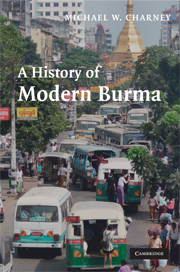Book contents
- Frontmatter
- Contents
- List of figures
- List of maps
- Chronology
- Abbreviations
- Introduction
- Chapter 1 Burma under colonial rule
- Chapter 2 The colonial center
- chapter 3 Self-government without independence, 1937–1947
- Chapter 4 The democratic experiment, 1948–1958
- Chapter 5 Dress rehearsals, 1958–1962
- Chapter 6 The Revolutionary Council
- Chapter 7 The BSPP years
- Chapter 8 Toward democracy, 1988–1990
- Chapter 9 Perpetual delay, 1990 to the present
- Conclusion
- Notes
- Readings
- Index
Chapter 9 - Perpetual delay, 1990 to the present
Published online by Cambridge University Press: 05 February 2015
- Frontmatter
- Contents
- List of figures
- List of maps
- Chronology
- Abbreviations
- Introduction
- Chapter 1 Burma under colonial rule
- Chapter 2 The colonial center
- chapter 3 Self-government without independence, 1937–1947
- Chapter 4 The democratic experiment, 1948–1958
- Chapter 5 Dress rehearsals, 1958–1962
- Chapter 6 The Revolutionary Council
- Chapter 7 The BSPP years
- Chapter 8 Toward democracy, 1988–1990
- Chapter 9 Perpetual delay, 1990 to the present
- Conclusion
- Notes
- Readings
- Index
Summary
One of the hallmarks of the military regime has been delay, a process it began in 1988, even before the elections. This seems to have been partly because the new military leaders were at a loss regarding what to do. They knew they did not want to hand over power to the NLD or to any other genuinely popular government. They also knew the ins and outs of keeping a country under martial law, what military regimes are particularly good at, over the course of short periods of time. Something permanent had to be found to provide a state apparatus that could nominally run the country in their name. Another factor was that they remained under the influence of the powerful Ne Win, who remained behind the scenes and for whom, it could be argued, they were nominally in charge. If the SLORC can be viewed as another Ne Win governing entity, then the politics of delay had historical antecedents. Ne Win was equally confused about what to do with the country when he seized control in 1962, other than to provide a more elaborate version of the caretaker regime, albeit with the promise of a more representative regime, as the later BSPP government would be portrayed.
What made the post-1988 delay longer, perhaps, was that Ne Win had run out of ideas. The Revolutionary Council was not a success economically or in putting down the civil war. The BSPP government, as 1988 demonstrated, was a resolute failure on all fronts. What is certain about the post-1988 regime was that it lacked even the rich ideological element that the earlier Ne Win regimes had been able to cultivate. Burma’s new leaders were a less creative lot than Ne Win, Aung Gyi, or Tin Pe. Indeed, most “creations” of the post-1988 regime have been rehashed from the Revolutionary Council and BSPP periods.
- Type
- Chapter
- Information
- A History of Modern Burma , pp. 170 - 200Publisher: Cambridge University PressPrint publication year: 2009



